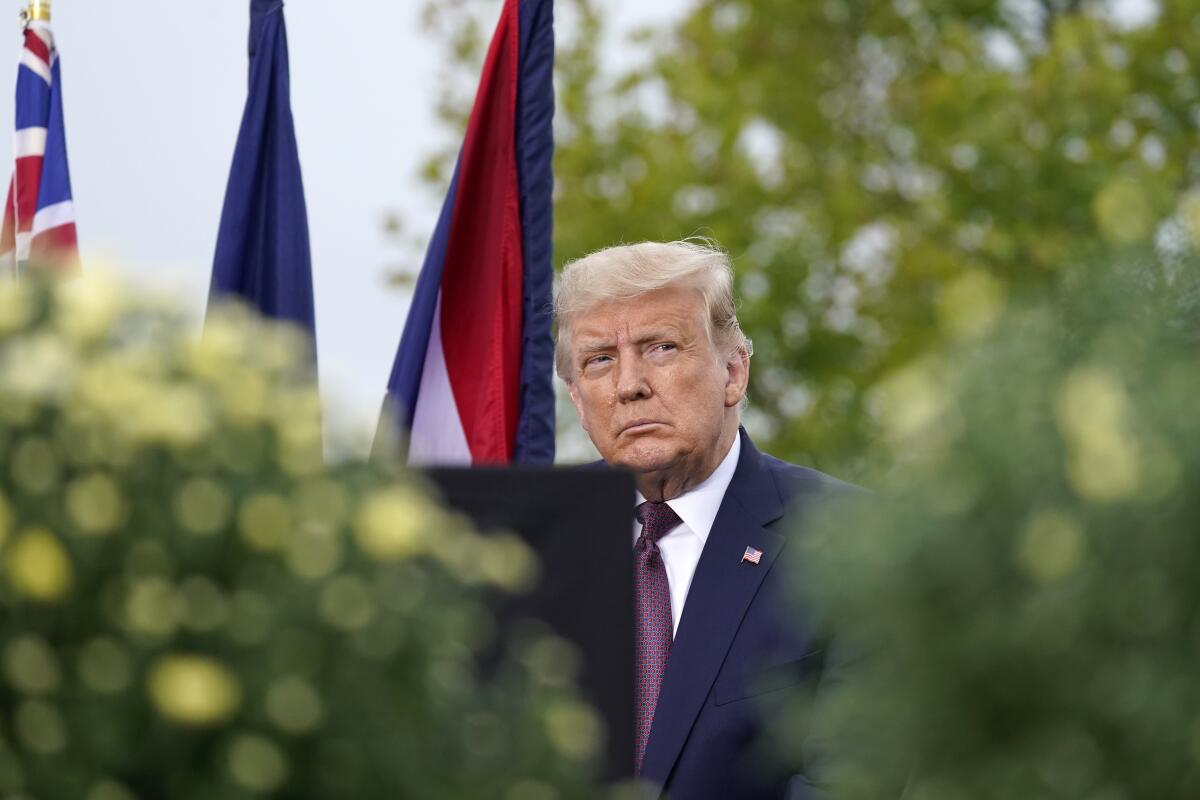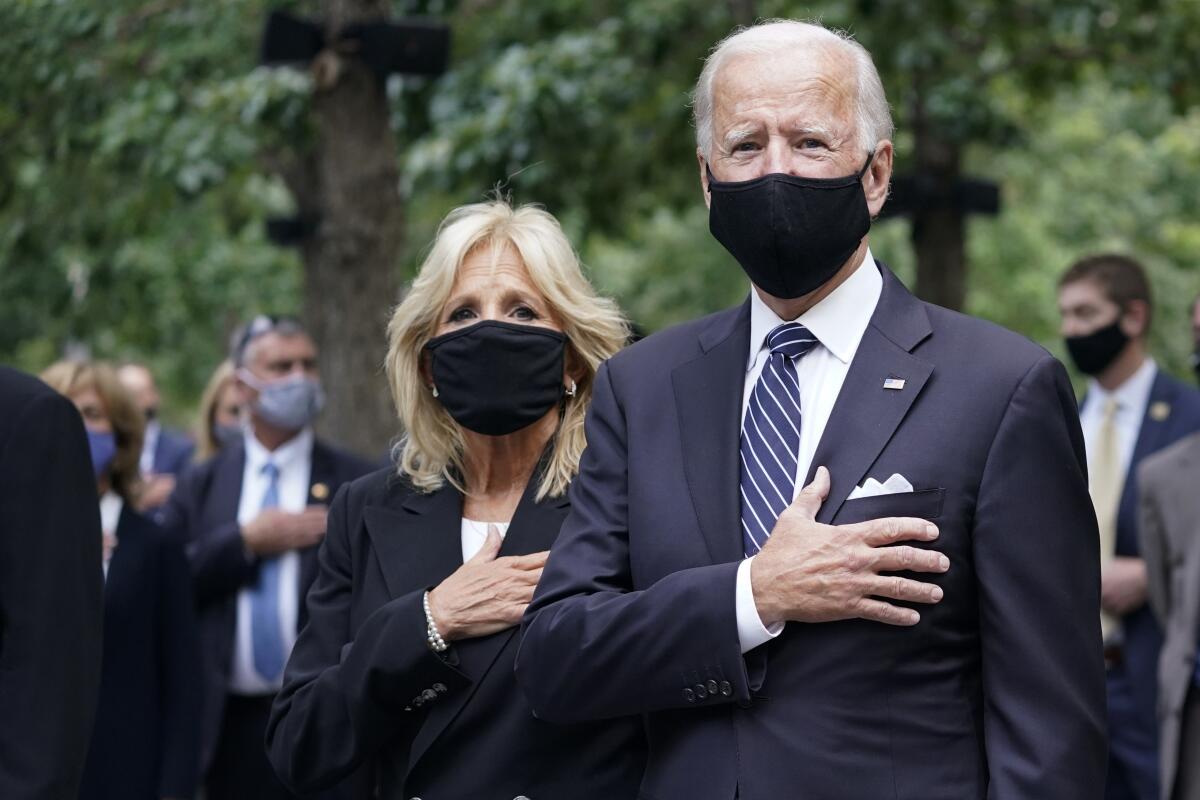Trump and Biden mark 9/11 anniversary, recalling a fleeting era of national unity

- Share via
WASHINGTON — President Trump and Democratic nominee Joe Biden both marked the 19th anniversary of the 9/11 terrorist attacks on Friday with visits to a memorial in Pennsylvania, a battleground state in the presidential race, although they didn’t cross paths.
Trump came first, attending a morning ceremony in the southern Pennsylvania field where a hijacked jetliner crashed after passengers overtook terrorists seeking to fly the plane into the U.S. Capitol in Washington.
For the record:
1:38 p.m. Sept. 17, 2020An earlier version of this article referred to Flight 93 as an American Airlines flight. It was a United Airlines flight.
Trump mourned the 40 “precious and beautiful souls” who died on United Airlines Flight 93, among the nearly 3,000 who perished that day at the World Trade Center in New York and at the Pentagon, in a speech extolling the courage of those who stormed the cockpit.
“The heroes of Flight 93 are an everlasting reminder that no matter the danger, no matter the threat, no matter the odds, America will always rise up, stand tall and fight back,” Trump said.
Biden, who has criticized Trump for his indifference to the pain and loss of Americans on multiple fronts, told reporters as he boarded a plane to a ceremony at the National September 11 Memorial in New York that his campaign had suspended all advertising to honor the anniversary.

“I’m not going to be making any news today,” he said. “I’m not going to talk about anything but 9/11 .... I’m not going to be holding press conferences. It’s a solemn day. We took all our advertising down; we’ll get back to the campaign tomorrow.”
In a conversation at the memorial with a 90-year-old woman whose son had died in his 40s, Biden talked about the death of his son Beau, then 46, in 2015.
“It never goes away,” he said, handing the woman a white rose, an exchange captured on a reporter’s video.
After attending the ceremony, where he crossed paths — and touched elbows — with Vice President Mike Pence, Biden and his wife, Jill, flew to Shanksville, Pa., to pay their respects to the victims of Flight 93.
During Trump’s visit, a bell was rung twice as each victim’s name was read aloud, as in years past. Those in the small crowd allowed to attend were required to sit six feet apart, a vivid reminder of the COVID-19 pandemic that has killed more than 190,000 Americans this year, nearly 64 times the total mourned every year on Sept. 11.
The 9/11 attacks, carried out by 19 skyjackers loyal to Al Qaeda, initially brought about a unifying period of shared national mourning and anger. But the sentiment faded as the “global war on terror” led to expanded surveillance of U.S. citizens, a war in Iraq based on faulty intelligence, and torture at secret CIA prisons.
In contrast, Americans have viewed this year’s confluent catastrophes of a deadly pandemic and economic nosedive through a political and cultural kaleidoscope, with little sense of collective grief or sacrifice.
Those who have died from COVID-19 have inspired little of the public outpouring of support seen after 9/11. The rising death toll — already nearly half the total number of Americans killed in World War II — has been startlingly abstract to many not directly affected, while the virus has disproportionately ravaged poorer, Black and Latino communities.
With few searing images as stark as the collapse of the World Trade Center’s twin towers, the tragedy has often been overshadowed by other tumult — a deep recession, rising tensions over racial injustice and police brutality, and, on the West Coast, vast wildfires that have devoured a parched landscape and forced hundreds of thousands of people to evacuate across several states.
Trump, who has repeatedly cited the protests against police brutality in Portland, Ore., has said almost nothing about the historic fires in the state. Oregon Gov. Kate Brown, a Democrat, said Thursday that Trump had not returned her phone call seeking federal assistance in combating the fires.
During his remarks in Shanksville, Trump vowed the country would “never forget” those who perished on 9/11, expressed gratitude for all who enlisted in the military in response and gave their blood on distant battlefields and recalled the brief moment of national unity.
“Citizens of all faiths, backgrounds, colors and creeds came together, prayed together, mourned together and rebuilt together,” Trump said.
Trump’s willingness to express a nation’s shared grief for victims of an attack nearly two decades ago stood in clear contrast to his reluctance to acknowledge the far greater suffering and death taking place on his watch.
Under fire this week for telling author Bob Woodward in March that he was intentionally playing down the danger of the coronavirus, Trump claimed that he was only projecting calm to keep the country from panicking.
He likened his leadership to that of British Prime Minister Winston Churchill during World War II, a comparison historians dismissed as ludicrous, noting that Churchill, far from downplaying the Nazi threat, steeled his nation’s will with sobering speeches framing the fight as a battle for civilization itself.
Trump had an opportunity to bring Americans together after the pandemic hit, but largely failed, said Timothy A. Naftali, a presidential historian at New York University.
Presidents Franklin Roosevelt and George W. Bush should have been better prepared for Pearl Harbor and 9/11, respectively, he said, but “they responded to the surprise by recognizing it as a moment for national unity and national resolve and they came out of it with the support of most Americans,” Naftali said.
On Friday, the day of remembrance offered a rare detente in campaign hostilities between Trump and his Democratic rivals, but it was short-lived.
By midday, Trump, whose campaign did not pause its attack ads, was back in the Oval Office to tout a diplomatic breakthrough in the Middle East. By the afternoon, he was back to berating Democrats on Twitter.
Biden, after visiting the memorial in Shanksville, stopped at a nearby firehouse to deliver beer to first responders.
More to Read
Get the L.A. Times Politics newsletter
Deeply reported insights into legislation, politics and policy from Sacramento, Washington and beyond. In your inbox three times per week.
You may occasionally receive promotional content from the Los Angeles Times.











